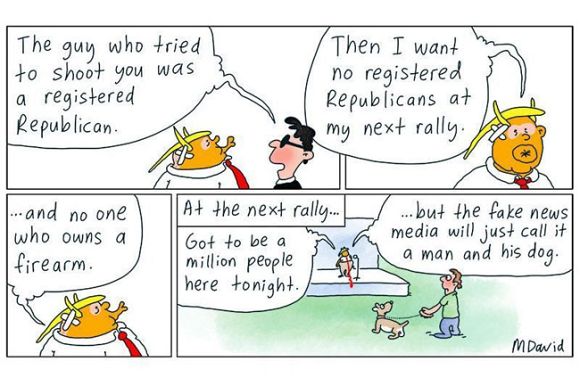Presidential candidate Donald Trump has become notorious for his aggression and bullying, which the mainstream media is happy to ignore. Rosemary Sorensen writes.
AT THE DAILY FEATURES conference back when I was editing the books pages for Brisbane’s Courier Mail, I was once witness to the kind of nasty, vicious, petulant, boorish outburst that now marks to an outlandish degree American presidential nominee Donald Trump’s responses to anything and everything.
Maybe the editor-in-chief had a bad hair day or had been bawled out by those up the hierarchy (we’re talking News Corp here). As the group of section editors gathered in the conference room, he sat like a cross cane toad at the head of the table, glowering until, with no warning except for that look of simmering fury, off he went.
We were useless, hopeless, pathetic, stupid. The pages of the newspaper we were responsible for were awful. The laziness! The rubbish! On notice, the lot of us!
The tantrum was spectacular.
Fear is a powerful emotion and the response in the room from a group of people who understood very well the culture of that place (rewards for applying yourself to the demands, punishment for stepping out of line) was a collective cowering. Sensible people knew that the response of least resistance was to ride it out, go back to your desk and get on with it. Yes, it was unfair, but them’s the breaks.
No one, least of all the editor-in-chief, expected there to be a conversation about the accusations, but – ah yes, reader – she harried him.
I spoke back, mildly suggesting that the abuse was a teensy bit unfair, that the features pages were pretty good and that the journalists and sub-editors working on them were often turning up early and leaving late, keen to deliver good content.
Looking around that table, I saw no one’s eyes. All heads dropped. They knew what was coming.
And it came, like spew from a kid with gastro. How dare I defend my colleagues! If I didn’t want to accept the abuse, I could leave, right now, walk out of that room and I was done, fired.
It was full on and, while I think I knew the threat was stupid, I also realised this was a showdown that the boss would never let me win. I didn’t leave the room. Maybe that was cowardly, but I think I just wanted to get on with the books pages for that week and all that drama was tiresome.
Only one of the other people in the room came up to me immediately after the meeting to tell me they thought the abuse had been a “bit unfair”, but we all went on as though nothing had happened.
Culturally, such aggressive behaviour has, over the past decades, become unacceptable in most workplaces and there are processes in place for complaint. Retrospectively, I find the editor’s tantrum comical and I’m still more upset by the lack of support in the room, which at the time seemed wimpish. I think that, like me, those people just wanted to get on with their jobs.
Now, however, Trump – and the way he’s being reported – is normalising that aggression once more. All the conventions of good manners have been trampled. The name-calling and reputational put-downs, the grotesque belittling and false accusations, the bile of uncontrolled contempt for anyone in his way — these are relayed in videos and reported in print immediately and everywhere, as media outlets of all stripes clamour for attention.
It's changed the rules of the game. Where there are places where dictators incarcerate or kill anyone who speaks out against unfairness and tyranny (the awful rigged trial of Hong Kong’s Jimmy Lai is but one example), in countries such as the USA and its acolytes (the UK and Australia) the method is, for now, a bit more subtle — if you can call what Trump is doing subtle. It grabs attention and puts your opposition into a corner. It controls the narrative.
It excites people, particularly those in the media who have lost, forgotten or never had the pride in their work that demands decency and fair play as the bedrock of their craft.
Can it be countered? What’s the most effective response to that loud, rude, aggressive push into the corner?
Because progressive liberals count among their ranks clever, quick-witted, well-educated and passionate extroverts, humour has been a brilliant defence against such bullying. But is it effective? Does it get through to those who are smacked between the eyes by the everywhere-images and soundbites?
It’s not a bad response. I wonder if I’d been clever enough to say something witty in that meeting all those years ago, what might have happened next. (I don’t think I’d have got a laugh, frankly.)
Somehow, the response has to shift the narrative, to take back control. That’s the importance of all the alternatives to the captured mainstream media, including websites like this one and all the social media forums where people find support to speak about things that are unfair. That’s why, too, there’s such enormous pushback against those alternatives: almost daily we see how speaking out results in attacks that wrest back the initiative by undermining the speaker.
There’s a sporting rule that says you play the ball, not the player. That’s a tough call when the player is making it all about them, shouting in your face, shoving you back into a corner of the playing field. It’s also a tough call when those commentators with the loudest voices aren’t interested in or care about what happens to the game – players, spectators, referees, the whole kit and caboodle – if the bullying cheat wins.
Rosemary Sorensen was a newspaper, books and arts journalist based in Melbourne, then Brisbane, before moving to regional Victoria, where she founded the Bendigo Writers Festival, which she directed for 13 years.
Related Articles
- Media enabling Trump's mission to destroy democracy
- Logic shows Trump cannot win another term, but don’t relax just yet
- CARTOONS: Trump picks new running mate
- America's gathering storm: Trump a victim of his own violent rhetoric
- Tenacious D comedy-rocker makes gag — prepare the gallows!
 This work is licensed under a Creative Commons Attribution-NonCommercial-NoDerivs 3.0 Australia License
This work is licensed under a Creative Commons Attribution-NonCommercial-NoDerivs 3.0 Australia License
Support independent journalism Subscribe to IA.














